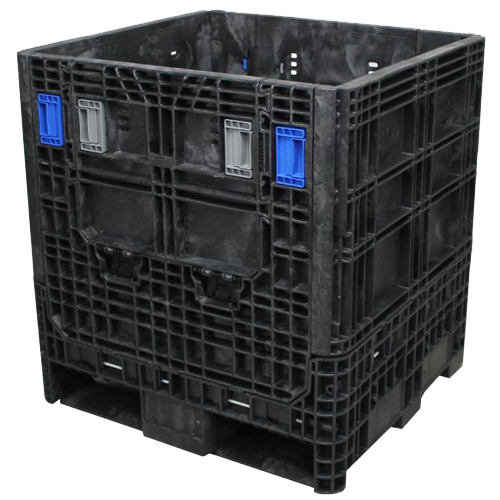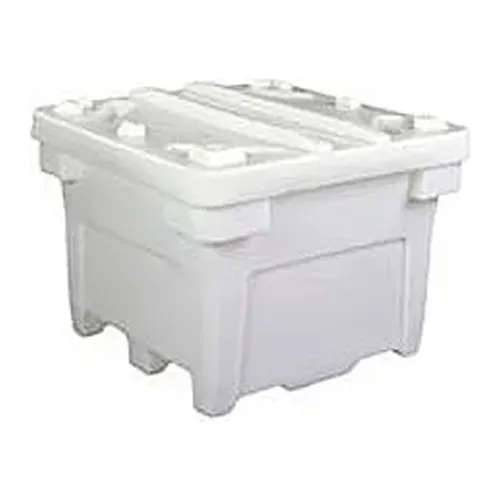The Duty of Mass Plastic Containers in Effective Recycling Practices and Sustainability
Bulk plastic containers are indispensable to modern recycling initiatives. Their design improves the performance of material collection and transportation, adding to sustainability objectives. These containers not just enhance space yet also aid in checking contamination degrees. Their execution is not without difficulties. Understanding the full scope of their impact discloses a complex relationship in between logistics and ecological obligation that warrants more exploration.
Understanding Mass Plastic Containers
Bulk plastic containers work as a vital part in numerous industries, promoting the storage and transport of items. These containers are typically made from durable products such as high-density polyethylene (HDPE) or polypropylene, which provide sturdiness and resistance to ecological aspects. Their design frequently includes attributes like stackability and modularity, enabling reliable use of area throughout both storage space and transportation.
Industries such as farming, food processing, and making often use mass plastic containers because of their light-weight nature and ease of handling. The containers can be found in numerous sizes and configurations, satisfying the specific requirements of different products. Their adaptability prolongs beyond mere functionality; they can likewise be customized with lids, takes care of, and identifying options to enhance use - Bulk Plastic Containers. Because of this, bulk plastic containers play an essential duty in optimizing logistics and supply chain operations across several markets, therefore adding to overall efficiency and cost-effectiveness
Advantages of Making Use Of Mass Plastic Containers in Recycling
When organizations focus on reusing initiatives, the usage of mass plastic containers significantly enhances the effectiveness of the process. These containers are made to enhance room, permitting the storage and transport of larger amounts of recyclable materials. This leads to less journeys to recycling centers, consequently decreasing gas consumption and associated discharges.
In addition, bulk plastic containers are long lasting and immune to various environmental variables, guaranteeing that products continue to be secured during handling and transportation. Their lightweight design better adds to reduce transportation expenses.
The harmony of these containers assists in much better sorting and handling of recyclable products, which can boost general recycling rates. Organizations that adopt bulk plastic containers additionally demonstrate a commitment to sustainability, positively affecting their brand image. Inevitably, these advantages not just enhance reusing practices however additionally contribute to more comprehensive environmental objectives
Exactly How Bulk Plastic Containers Facilitate Material Collection
Reliable product collection is significantly boosted by the use bulk plastic containers, as they provide a organized and efficient remedy for collecting recyclable products. These containers are designed to fit big volumes of products, which simplifies the sorting and storage space process. Their stackable design maximizes area utilization, making it easier for centers to organize recyclables without clutter.
Furthermore, bulk plastic containers are weather-resistant and durable, permitting for exterior placement without deterioration. This resilience guarantees that materials remain safeguarded until they are accumulated for processing.

The uniformity in shapes and size of these containers promotes standardization across collection points, allowing far better tracking of recyclable quantities. Their clear nature allows for very easy visibility of components, assisting in the surveillance of contamination levels and assuring that just appropriate materials are gathered. On the whole, bulk plastic containers play an essential function in streamlining the product collection procedure, therefore promoting effective recycling practices.
Transport Effectiveness and Environmental Influence
Transport effectiveness plays a crucial duty in the reusing process, particularly via the optimization of load ability in bulk plastic containers. By maximizing the quantity of material transferred, business can significantly decrease the number of trips called for, thus reducing their carbon footprint. This technique not just enhances operational efficiency however likewise adds to extra lasting environmental methods.

Enhancing Tons Ability
Although maximizing tons ability is frequently forgotten, it plays an essential role in improving transport efficiency and minimizing environmental effect in recycling methods. By maximizing the quantity that bulk plastic containers can hold, reusing operations can minimize the variety of trips needed for transportation. This not just reduces gas usage yet likewise lowers the deterioration on lorries. Reliable tons monitoring permits centers to utilize area efficiently, guaranteeing that each transport cycle is as productive as feasible. In addition, well-optimized tons can result in much better arrangements with logistics service providers, possibly lowering total prices. Ultimately, boosting tons capability contributes to an extra lasting reusing system by fostering reliable source use and decreasing waste generated during transport.
Reducing Carbon Footprint
As recycling procedures venture to lessen their environmental impact, reducing the carbon footprint connected with transportation becomes a crucial goal. Mass plastic containers play a crucial duty in achieving this objective by improving lots efficiency and enhancing logistics. Their light-weight yet durable layout enables maximum freight area application, reducing the number of journeys needed to transport products. By consolidating shipments, reusing facilities can reduce gas intake and greenhouse gas emissions. On top of that, strategically finding recycling centers decreases transportation distances, furthermore decreasing carbon results. In addition, utilizing fuel-efficient automobiles and alternate power sources improves total sustainability. By incorporating these methods, the reusing industry can considerably diminish its carbon footprint, adding to a more sustainable future.
Difficulties in using Mass Plastic Containers

Contamination Problems
Contamination issues stand for a significant challenge in the efficient use mass plastic containers within reusing techniques. These containers typically build up residues from previous components, bring about mixed materials that can impede the reusing process. Pollutants such as food waste, chemicals, or non-recyclable materials can endanger the integrity of the whole batch, resulting in enhanced disposal expenses and reduced reusing rates. Additionally, inappropriate cleansing or sorting can exacerbate these problems, making it hard for reusing centers to refine materials efficiently. The presence of impurities not only influences the top quality of recycled products however also weakens the overall sustainability efforts focused on reducing plastic waste. Addressing these contamination difficulties is crucial for boosting the effectiveness of bulk plastic container recycling.
Recycling Infrastructure Limitations
Ineffectiveness in reusing infrastructure presents substantial obstacles for the reliable administration of mass plastic containers. Several recycling centers do not have the capacity to refine large volumes of these containers successfully, causing raised delays and costs. Inadequate sorting modern technologies commonly lead to contamination, as mass containers may be mixed with other materials, making complex the recycling process. Minimal transport choices additionally prevent the motion of mass plastic containers to appropriate reusing centers, bring about boosted landfill waste. Furthermore, a lack of standard methods for bulk container recycling produces complication among consumers and businesses, further complicating efforts to advertise sustainability. Dealing with these infrastructure restrictions is necessary to boost reusing practices and maximize Visit This Link the capacity of bulk plastic containers in a round economy.
Best Practices for Executing Bulk Plastic Containers
When organizations take into consideration executing mass plastic containers in their reusing techniques, they should prioritize a critical approach that improves effectiveness and reduces contamination threats. Initially, selecting the proper container size and type is vital to accommodate the volume of products being processed. Organizations should likewise establish clear labeling and signs to lead individuals on appropriate disposal approaches, decreasing complication and mistakes. Regular training sessions for staff can further enhance these techniques, making sure every person understands their functions in maintaining recycling stability.
In addition, organizations should implement a regular maintenance routine to inspect and tidy containers, avoiding the build-up of impurities. Partnering with local recycling facilities can also improve the collection procedure, making certain that products are effectively processed. Finally, organizations should keep track of and evaluate their recycling metrics, utilizing this data to refine techniques in time and advertise continuous enhancement in their sustainability efforts.
The Future of Mass Plastic Containers in Sustainable Practices
As organizations increasingly focus on sustainability, the role of bulk plastic containers in recycling techniques is readied to advance significantly. Developments in materials science are leading to the development of recyclable and naturally degradable alternatives, enhancing the ecological advantages of mass plastic containers. In addition, the application of closed-loop systems will certainly permit simpler collection and repurposing of these containers, decreasing waste and resource intake.
Technical advancements, such as wise radar, will allow companies to monitor the lifecycle of mass containers, enhancing performance in reusing processes. As consumer demand for lasting methods grows, businesses will likely adopt bulk plastic containers created for reuse and long-term worth. Moreover, partnership in between federal governments and industries will promote the facility of standard recycling methods, guaranteeing that mass containers are successfully integrated into wider sustainability campaigns. Overall, the future of bulk plastic containers appears appealing, with substantial potential for adding to a circular economy.
Often Asked Inquiries
Exactly How Are Mass Plastic Containers Made and What Materials Are Utilized?
Bulk plastic containers check this site out are usually made from high-density polyethylene (HDPE) or polypropylene (PP) These products are processed with injection molding or blow molding techniques, causing sturdy, lightweight containers suitable for Your Domain Name various storage and transportation needs.
Can Bulk Plastic Containers Be Reused Several Times Before Recycling?
Yes, bulk plastic containers can be recycled several times before reusing. Their longevity and design permit duplicated usage in various applications, advertising sustainability and resource efficiency while lowering the requirement for brand-new containers.

What Certifications Exist for Mass Plastic Containers in Recycling?
Different qualifications for bulk plastic containers include the Recycling Collaboration's qualification, the Cradle to Cradle Qualified ™ requirement, and the Sustainable Packaging Union's standards, ensuring containers fulfill certain environmental and recyclability criteria for reliable recycling.
Exactly How Do Mass Plastic Containers Compare to Various Other Recycling Storage Space Options?
Mass plastic containers supply greater durability and ability compared to various other recycling storage alternatives, decreasing the threat of contamination and facilitating reliable transportation. Their layout supports much better organization, boosting total efficiency in reusing operations.
What Is the Life expectancy of a Bulk Plastic Container in Recycling Processes?
The life-span of a bulk plastic container in recycling processes generally varies from 5 to ten years, relying on use, worldly high quality, and environmental conditions, enabling for multiple cycles of use prior to ultimate disposal or recycling.
When companies prioritize reusing initiatives, the application of mass plastic containers greatly improves the effectiveness of the process. Transport performance plays a vital function in the reusing process, particularly through the optimization of load capacity in bulk plastic containers. The use of mass plastic containers in reusing practices deals with significant obstacles, especially worrying contamination concerns and limitations within reusing infrastructure. Contamination problems stand for a considerable obstacle in the effective use of bulk plastic containers within recycling techniques. When organizations consider implementing bulk plastic containers in their reusing techniques, they must prioritize a tactical strategy that boosts effectiveness and decreases contamination threats.